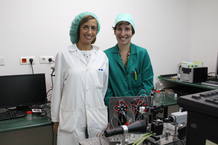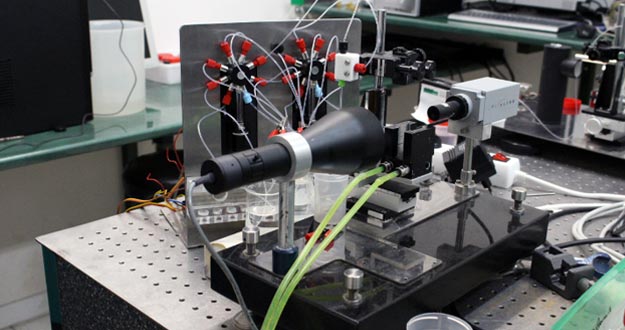Scientists, at the University of Granada (UGR) and the “Azti-Tecnalia” technological centre, have developed a milk protein, more easily digested, by the human body, and which could reduce the allergenicity of milk, maintaining their properties.
The researchers have managed to change, by treatment with pulsed light, a milk protein called “Beta-lactoglobulin”.
This protein, present in whey, is responsible for approximately 10% of dairy allergies and thanks to this treatment is much more digestible.
As explained by the UGR researcher, Julia Maldonado-Valderrama, one of the authors of this work, published in the journal “Soft Matter”, the difficult digestion of Beta-lactoglobulin is because these proteins have a compact and complex structure, that resist enzymatic attack, during digestion.

Teresa del Castillo Santaella and Julia Maldonado-Valderrama
"However, this structural complexity is necessary for proteins, to perform its structural function as a stabilizer of emulsions or foams agent", explained.
One way to facilitate the digestion of proteins, could be breaking or unwinding its structure. However, if the structure of the protein is too degraded, it loses its functionality.
"We used a milk protein modified, by pulsed light treatment, a method of bacterial inactivation widely used in the food industry; but it had never been applied before, to modify proteins", said Maldonado-Valderrama.
This process, patented by the equipment of the “AZTI-Tecnalia” technological centre, degrades the protein structure, as the number of light pulses applied is increased.
Thus, in this work, first of all, the scientists found, that the functionality of the protein is not affected by the pulsed light treatment.
"In fact, we show that the pulsed light, in some cases, even improves the emulsifying properties of milk protein. After, we check the effect of digestion on this modified protein, with pulses of light", says the researcher.
To do this, the researchers used a device, designed and built at the University of Granada, called Octopus, which allows them to simulate the digestive process of a protein, in a single drop of emulsion.

"Octopus"
Thus, the simulation of the digestive process showed that light treatment facilitates the digestion of the protein, particularly in the small intestine.
"Finding ways to improve the digestibility of proteins, without altering its functionality, is an ongoing challenge, in food technology, and, in this sense, the pulsed light treatment is a promising tool to design food products of low allergenicity", concludes the researcher from the UGR.
Well. I think this project is so interesting, now day, because many people have this problem of milk allergy. I know several persons with this problem and I hope that researches achieve a final solution, to all of them.
Until my next post, kind regards,
Luis.
Sponsored by Costaluz Lawyers.
Please click below:
